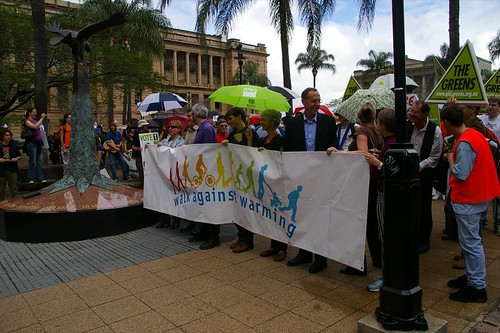Robin McKie, science editor
Sunday January 21, 2007
The Observer
A study by the world's leading experts says global warming will happen faster and be more devastating than previously thought
Global warming is destined to have a far more destructive and earlier impact than previously estimated, the most authoritative report yet produced on climate change will warn next week.
A draft copy of the Fourth Assessment Report of the Intergovernmental Panel on Climate Change, obtained by The Observer, shows the frequency of devastating storms - like the ones that battered Britain last week - will increase dramatically. Sea levels will rise over the century by around half a metre; snow will disappear from all but the highest mountains; deserts will spread; oceans become acidic, leading to the destruction of coral reefs and atolls; and deadly heatwaves will become more prevalent.
Article continues
The impact will be catastrophic, forcing hundreds of millions of people to flee their devastated homelands, particularly in tropical, low-lying areas, while creating waves of immigrants whose movements will strain the economies of even the most affluent countries.
'The really chilling thing about the IPCC report is that it is the work of several thousand climate experts who have widely differing views about how greenhouse gases will have their effect. Some think they will have a major impact, others a lesser role. Each paragraph of this report was therefore argued over and scrutinised intensely. Only points that were considered indisputable survived this process. This is a very conservative document - that's what makes it so scary,' said one senior UK climate expert.
Climate concerns are likely to dominate international politics next month. President Bush is to make the issue a part of his state of the union address on Wednesday while the IPCC report's final version is set for release on 2 February in a set of global news conferences.
Although the final wording of the report is still being worked on, the draft indicates that scientists now have their clearest idea so far about future climate changes, as well as about recent events. It points out that:
- 12 of the past 13 years were the warmest since records began;
- ocean temperatures have risen at least three kilometres beneath the surface;
- glaciers, snow cover and permafrost have decreased in both hemispheres;
- sea levels are rising at the rate of almost 2mm a year;
- cold days, nights and frost have become rarer while hot days, hot nights and heatwaves have become more frequent.
And the cause is clear, say the authors: 'It is very likely that [man-made] greenhouse gas increases caused most of the average temperature increases since the mid-20th century,' says the report.
...
Read the article.
Monday, January 22, 2007
Global warming: the final verdict
Posted by
National Enquirer
at
9:14 pm
![]()
Subscribe to:
Post Comments (Atom)





No comments:
Post a Comment